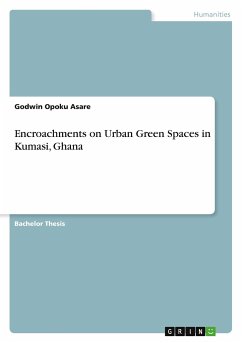Bachelor Thesis from the year 2021 in the subject African Studies - Culture and Applied Geography, grade: A, Kwame Nkrumah University of Science and Technology, language: English, abstract: This paper is about the encroachments on urban green spaces in Kumasi, Ghana. Green spaces offer vital ecosystem services to humans that are essential to plan for in cities. In the wake of global activism on climate, these spaces are among the most recommended means to fight the increasing climate change; however, in the city of Kumasi, the existing green space suffers higher levels of encroachments. Due to this, there are legislations established to safeguard these spaces. Therefore, this study seeks to determine the level of understanding of property owners on this legislation and assesses the level of adherence to these legislations in the city. A descriptive case study design approach was employed in the study. The study targeted institutions responsible for managing green spaces and property owners. The study found that unawareness of green space protection legislation, ineffective development control enforcement, and the demand for land for commercial activities were the key factors for encroachments on green spaces in Kumasi. The ineffective collaboration between green space management institutions has led to the change of use of green spaces, lack of participation and community sensitization on the benefits of green spaces has further worsened encroachment in the city. This study concludes that city authorities should give residents, traditional leaders, and other development agents persistent education on the benefits of green spaces and the regulations that protect them, enforce developments control and relocate activities in nature reserves, and also there should be collaboration among concomitant bodies for the management of green spaces should be improved.








